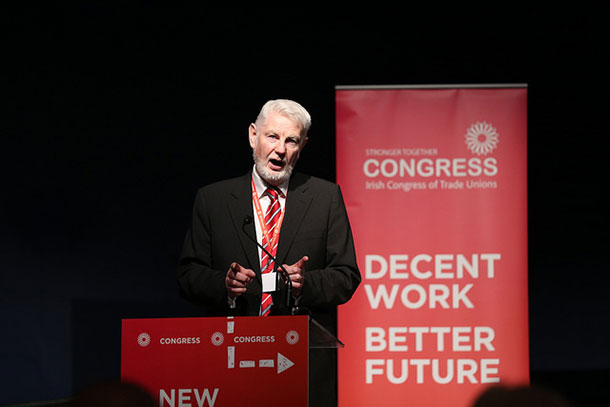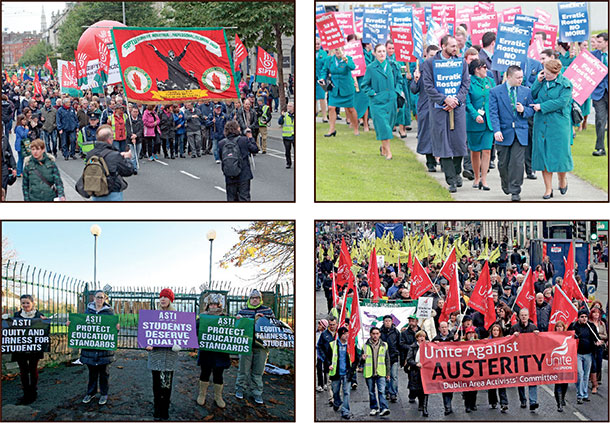12 January 2015 Edition
Trade unions and ‘the titanic battle of ideas’
Building an Alternative

• David Begg, General Secretary Irish Congress of Trade Unions, Executive Committee member, European Trade Union Confederation
A coherent narrative – in the form of a vision for the future, how a new, progressive Ireland might be built – has not yet emerged from this more populist Left
THE 1980s ushered in a global counter-revolution that transformed the world for the worse.
Margaret Thatcher’s oft-quoted dictum that “there is no such thing as society” was less an observation and more a declaration of intent, the enunciation of a crucial goal of neoliberal ideology.
For buccaneering, speculative markets to triumph, society as it existed had to be dismantled. That in turn required a full-scale assault on any organisations or institutions that promoted collectivist values – the trade union movement being an obvious target.
Fast-forward 30 years and the triumph of the market was brought to its natural, logical conclusion with the global collapse of 2008.
Yet the most immediate consequence was to further entrench the same neoliberal doctrine that caused the crisis.
Because it had so manifestly failed, the onset of crisis should have spelt the death knell of neoliberalism, but instead it appears to have given it a blood transfusion.
Unfortunately, the collapse also found the traditional social-democratic Left weakened and wanting.

• The trade union movement is critical to the process of renewal of the Left
It seems certain that 30 years of neoliberal counter-revolution sapped its intellectual confidence and vigour, while the 1990s dalliance with “The Third Way” (so beloved of Blair and Clinton) damaged its credibility.
But there are other reasons for the weakness of the global Left.
The collapse of the Soviet Union and the decision of China to become capitalist by decree fundamentally shifted the balance of power between capital and labour, leaving organised labour and its political allies in a far weaker state.
The addition of one and a half billion new industrial workers (in China and India) undermined the collective bargaining strength of trade unions almost overnight. Capital could go where it wanted to find new workers.
Technology and the deregulation of capital markets exacerbated this, with footloose corporations forcing a race to the bottom in labour standards and tax.
In developed economies we now see a hollowing out of the labour market, the rise of low-paid, precarious work and increased inequality. If Thomas Piketty’s thesis is correct, we will see Dickensian levels of social division across Europe in the near future.
If you have free trade, the free circulation of capital and people and also undermine the social state and all forms of progressive taxation, the temptations of defensive nationalism and identity politics will very likely grow stronger.
This is seen in the rise of the Tea Party in the US, UKIP in Britain and the Front National in France.
But the drift away from mainstream politics is not an exclusively right-wing phenomenon.
It’s happening on the Left as well with Podemos in Spain, Syriza in Greece, the SNP in Scotland and Sinn Féin here.
Perhaps the most interesting aspect is that these parties have come from outside the traditional Left and labour movement and are largely responding to economic policies imposed from outside, by the Troika.
Crucially, they now occupy a space left open by traditional social democratic parties who have been unable to advance a persuasive alternative narrative to austerity.
But that coherent narrative – in the form of a vision for the future, how a new, progressive Ireland might be built – has not yet emerged from this more populist Left either.
If it is true that a new politics is being born in Ireland – particularly on the Left – it is imperative that this compelling narrative is central to its foundation.
Otherwise, the neoliberal vision will simply colonise and dominate all available policy space.

• Food banks: The onset of the crisis should have spelt the death knell of neoliberalism
The Left needs to recognise that we are engaged in a titanic battle of ideas. It is a battle we must win if we are to have any hope of shaping a better world, of tilting the balance in favour of the majority.
To do that we must be able to convince our fellow citizens that there is a better and fairer way of running the economy and society.
We must credibly explain that people are homeless and go hungry as a result of political choices and not because of the application of some iron law of economics.
Most importantly of all, we have to assert that the economy must serve society and not vice versa. As the largest civil society body on the island of Ireland, the trade union movement is critical to this process of renewal
Organised labour has existed in Ireland for more than 200 years. It was an underground movement until 1824, when Westminster decriminalised trade unions by revoking the Combination Acts. By 1850, all trades were unionised.
The movement went on to found the Labour Party in 1912. The 1916 Proclamation was printed in Liberty Hall, and the Citizen Army was first into the GPO.
The 1919 Democratic Programme represented the trade union movement’s contribution to the shaping of the new state.
It seems that moment may be on us again.




